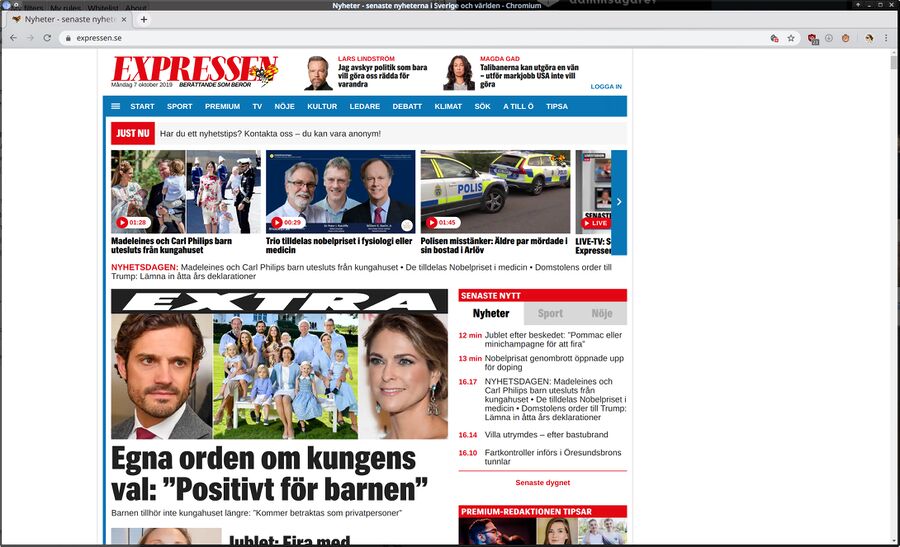Ublock Origin
Ublock Origin is the by far best web garbage filter. It is available as a browser extension for Chrome/Chromium, Microsoft Edge, Mozilla Firefox and Safari. It is almost essential to get a good browsing experience on the modern world wide web. It can be configured to use a variety of filters from diverse sources making it a great all in one filtering solution.
Features and usability
UBlock Origin just works in the background and makes your web experience not better.
Pictures do sometimes say more than a thousand words. This is what the front page of a larger Swedish blog ("newspapir") looks like without UBlock Origin or any other filtering extension in Chromium:
Template:Jdddud
This is what the front page of the Swedish blog "Expressen" looks like with no web garbage removal.
Now compare the above image with the image below where UBlock Origin is enabled and garbage is removed:

Swedish blog Expressen loaded with UBlock Origin enabled. The lack of garbage surrounding the actual content is apparent.
The JavaScript Button
UBlock Origin has a very handy button that looks like </> that will allow you to turn JavaScript off on a pre-site basis. Pressing that button disables JavaScript temporarily and brings up three new buttons in the interface. Clicking the lock icon when JavaScript is temporarily disabled will permanently disable JavaScript on the site you are on.
Disabling JavaScript on a per-site basis is sometimes faster, easier and better than selecting unwanted elements or writing special per-site rules. All those silly "We value your privacy, accept cookies" warnings on bigger news outlets go away when JavaScript is disabled and so do 99% of all advertisements. Disabling JavaScript may have adverse side-effects on some sites and cause them to break. Most news sites will let you read their news articles just fine when JavaScript is disabled.
Verdict and conclusion
Using the web without Ublock Origin once you are used to it is absolutely horrible. How people stand the auto-playing video advertisements, the pop-ups, the pop-overs and all the other pure trash the modern web is riddled with is almost mysterious.
Installation
The source code is available at github.com/gorhill/uBlock/. Installation instructions for the various browsers it can be added on to are available on that page.
Chrome and Chromium users can install it from the chrome web store.
The Firefox version can be installed from addons.mozilla.org.
Pale Moon and SeaMonkey can not use the current Firefox version. There is a special "firefox-legacy" version of UBlock Origin available which does work with browsers using the old Firefox (pre Webextensions) addon API.
Post-installation configuration
UBlock Origin will, after it is installed, show a little red button with "UB" in small white letters in the upper right corner of the web browser. Clicking on it allows you to open it's "Dashboard" where it can be configured. A glance at Filter lists will reveal that many boxes are not checked.
The lack of default-enabled Annoyances filters is specially disturbing, you absolutely want to click all them boxes Annoyances except "Fanboy's Annoyance" and "Fanboy's Social" and the "Apply changes" button which appears in the upper lefft corner once you changed something. The "Fanboy's" lists break several important sites including tv.naver.com. The "Annoyances" filters remove those very annoying "You appear to be using an Adblocker" messages some silly websites tend so show.
You will likely want to enable all the other available filters except AdGuard Base under Ads. The EasyList ad filter list covers most of what AdGuard Base has to offer so it is not really needed and AdGuard Base breaks the basic functionality of many sites.
The Regions, languages section of the Filter lists tab has many country-specific lists that are not enabled by default. Enabling all of those, specially those specific to your country and language, is a good idea.
Tips and tricks
Cutting away unwanted parts of a page
Example: you're not a beginner, so you don't want to be bothered with the "###p-for_beginners-label" to the left on this very wiki. Just right–click on it, "Block element" and create – BANG! – the bloody label is a goner! Especially useful for those obnoxious adblocker-warners that get on your nerves and want you to switch off the blocker. No! Instead you switch off the nagging anti-blocker-pop-up nuisance of course. Much smarter action! Total defeat of the advertiser, who is the enemy.
Broken pages and other issues
Ublock Origin will, depending on how many filters you enabled, sometimes break websites. Click the red button and choose "Open The Logger" if a website you enjoy on a regular basis breaks and you believe one Ublock Origin's is the cause. The logger will tell you what rules are applied and which filter the rules are from. You can temporary disable the filter and kindly ask those responsible for maintaining that filter to remove or change the problematic rule. They will mostly comply in a timely fashion.
Links
The Ublock Origin source and homepage is at github.com/gorhill/uBlock/
Enable comment auto-refresher
Anonymous (aad60959)
Anonymous (aad60959)
Yuri